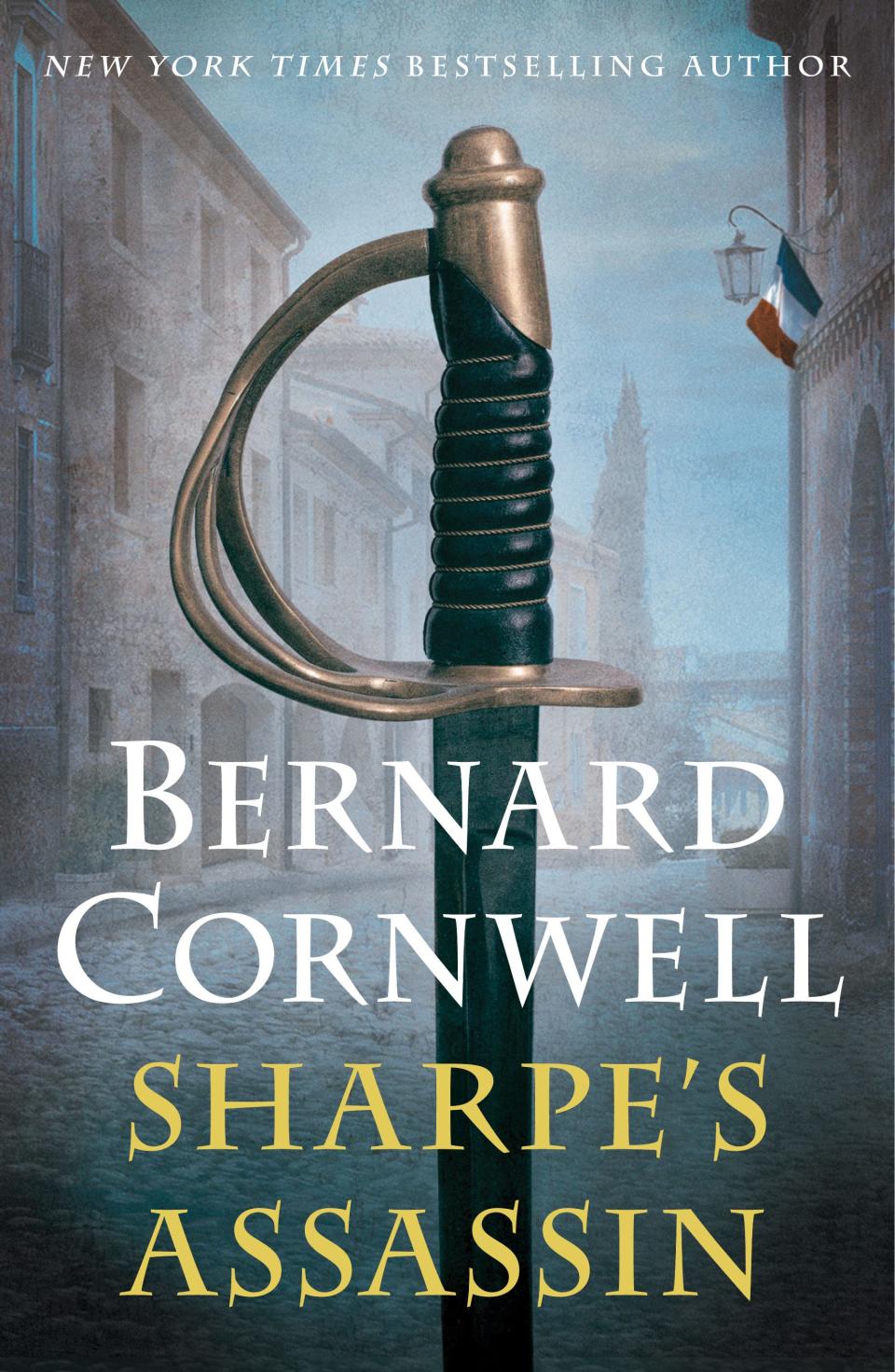Sharpe's back: After 15 years, author Bernard Cornwell returns to original hero, and rogue
- Oops!Something went wrong.Please try again later.
“Outsider. Hero. Rogue. And the one man you want on your side.”
That’s how global best-selling author Bernard Cornwell’s most famous hero, Richard Sharpe, is described as he resurfaces for the first time in 15 years in the just-released “Sharpe’s Assassin,” his 22nd adventure.
Cornwell, who lives much of the year in Chatham, says he had long expected to return to writing about the exploits of the Napoleonic-era British soldier – and scoundrel – who was played by actor Sean Bean in the popular “Sharpe” British TV series. Book and TV fans had been asking for years when the next Sharpe book would come out.
With “Sharpe’s Assassins” hitting No. 2 on the best-seller list in Cornwell’s native England, where it debuted earlier this fall, readers are happy to have the rogue return. This time — following retirement after the adventures in 2006’s “Sharpe’s Fury” — the “man with a reputation” is involved in the occupation of Paris in 1815, after being asked a favor by the Duke of Wellington following the Battle of Waterloo.

History that's hard to believe
Some of the history around Sharpe’s new 19th-century adventures may seem far-fetched, the author says, but it’s all true.
“The events really happened, even the unbelievable ones,” Cornwell says in a phone interview. “That’s always nice when you can write a book and put something in it, and you think ‘Nobody will believe that that happened.’ But it did happen.”
When asked for an example, Cornwell says, “Well, there was an attempt to blow up the Duke of Wellington, like the Gunpowder Plot (from 1605), and it was in a building that became the American Embassy. When I wrote it, I thought ‘No one will believe this. I should take it out.’ But I left it in because I just liked it.”
Sharpe's weapons: Author Bernard Cornwell shows off and explains rifles and a sword his hero might have used
He had long thought of Sharpe’s return as a” retirement project,” Cornwell says, though, at 77, he doesn’t sound like he considers himself retired. Creating “Sharpe’s Assassin” followed a routine familiar to the prolific author of more than 50 novels: getting up in the morning and walking into his study to write.
There was little difference in creating this book during the early months of the pandemic, he says, considering that writing is a solitary enterprise, anyway. He couldn’t visit with his friends in real life, maybe, but Cornwell visited through the book with one of his oldest literary companions.
“I just enjoy writing him. … I’d written 21 books about him before this last one. It’s a lot of books, so I’d spent at least a decade of my life in his company – at least,” Cornwell says. “And I like him. I enjoy his company, grumpy though he is.”
Sharpe was the start
Creating Sharpe was how Cornwell began his writing career. He had been the head of current affairs television for the BBC in Northern Ireland when he met a visiting American named Judy and fell in love. She was unable to move to Britain for family reasons, Cornwell’s bio says, so he moved to the U.S. but couldn’t get a green card. Becoming a writer did not require one.
Concerts, authors, monkeys & a serial killer: 7 top things to do on Cape Cod Dec. 10-16
Cornwell had long been an ardent fan of C.S. Forester’s Horatio Hornblower novels, about a Napoleonic War-era Royal Navy officer, and realized there was no literary counterpart on land. That led to his first literary creation being Sharpe in 1980, at about the same time he married Judy, and he found quick publishing success.

The Sharpe series, which includes a few short stories, has sold more than 20 million copies worldwide. After the early 2000s, though, other books had until now taken precedence for Cornwell — particularly the 13 books of the “Last Kingdom” series, which also became the basis for a British television show. That series starred the ninth-century Saxon warlord Lord Uhtred of Bebbanburg, reportedly an ancestor of Cornwell’s.
In the intervening years, there was also “Fools and Mortals,” Cornwell’s novel revolving around Shakespeare’s younger brother. The book was an ode to the former Monomoy Theatre in Chatham, where the best-selling author spent many summers acting – including as Prospero and other Shakespearean characters.
On the small screen: New Hallmark Channel Christmas romance movie is based on Nantucket author's book
When asked why last year had become a good time to finally return to Sharpe, Cornwell responded: “I don't know if it was a good time, but it's something I wanted to do for a long time. I thought the moment I finished with Uhtred that it was a good time to go back to (Sharpe). … I just thought there's more to be done there. I think there still is. I think I'll do another one, at least one more.”
And, he adds with a laugh, “I couldn’t think of what else to write.”
Regency characters are 'fun'
“Sharpe’s Assassins” continues the story in chronological order, and while not all of Cornwell’s Sharpe novels have done that in succession, the timing made sense to him for Sharpe’s return.

“I wanted to sort of keep the story going. Following up Waterloo seemed an obvious thing to do. Again, it's a period when people don't really know that much about what went on. There's a sort of feeling that you know, OK, Waterloo and then a few days later, the French surrender, but it wasn't quite as easy as that.”
When asked why this period in history is something he’s particularly interested in, Cornwell says, “I love the Regency period as it is, but I suppose it's because it was always the Hornblower books that got me going. And if you’re going to write about the Napoleonic Wars, you end up writing about the Regency.”
Turning the page: 7 new books by 5 Cape Cod authors: romance, memoir, thriller & poetry
That period was also “before Britain became respectable, which makes (it) a lot more fun to write. Victorians became incredibly respectable. They actually bore me. I’m not saying they all were, there were some splendid people there. … (But in the Regency period), there were people who break rules. They’re fun.”
While Cornwell has a vast knowledge of British history, including what is the background for Sharpe’s adventures, he says he has no aim to teach readers history through his novels.
“Oh no, that would be terribly pompous of me. I just want to write a story,” he says. “I think it helps if people feel that the story is authentic. It’s as simple as that. I never set out to educate.”
The goal is just to have an adventure then? “Yes, absolutely.”
This article originally appeared on Cape Cod Times: After 15 years, author Bernard Cornwell pens new Richard Sharpe book
